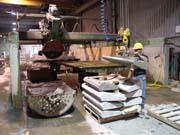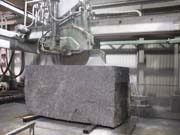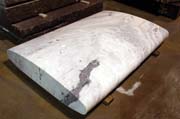
Close to the border of Maine and within several hours driving distance from Montreal and Québec City, Polycor's state-of-the-art manufacturing complex is tucked away in Saint-Sébastien, Québec, Canada, among rolling hills and green pastures. The facility has been in operation since 1911, and was purchased by Polycor Inc., a large quarrier and fabricator of natural stone headquartered in Québec City, in 1990. During the past 15 years, the company has worked to continually improve efficiency and increase prod-uction capacity at the facility. Its most recent addition is Polycor Slabs, which is equipped with state-of-the-art machinery, including four wire saws for cutting blocks into slabs.
A 36,000-square-foot building houses the new slab operation, according to Jean St-Onge, President of Polycor Granite Bussiére, Polycor Tiles and Polycor Slabs. “The timing was right, so we expanded,†he said, adding that it took almost two years to complete - officially opening in December 2004.
Among the equipment in the slab plant are four Bideseimpianti wire saws - two for shaping and two for cutting the blocks into slabs. Of the two for cutting, one has 58 wires to produce 2 cm slabs, while the other has 42 wires for 3 cm slabs. After blocks are processed into raw slabs, the material is then processed on state-of-the-art machinery from Protec and Breton for automatically applying resin and polishing. The resin line includes automated units for applying the resin as well as large-scale driers. These driers - which can hold 30 slabs at one time - remove all moisture from the slab prior to application of the resin, maximizing penetration. After resin products from Tenax are applied, the slabs move onto a second drier, which speeds the resin curing time. Slabs then receive their final polish on a Breton slab polishing line, which is equipped with abrasives from Tenax.
On average, a minimum of 20 blocks are cut per week, and a total of 1.3 million square feet of slabs are processed annually, according to St-Onge, adding that the company cuts all four sides of the slab to reduce waste for its customers. Within 18 months, it intends to boost its production to 1.5 million square feet.
“Because we operate with wire saws, we can produce faster than if we used gangsaws,†said St-Onge. Cutting time is approximately six hours per block. “Once the slab is out of the polishing line, a photo is taken of every slab, which can be sent to the customer,†said St-Onge. “Each slab is inspected one by one. Quality control is very important.â€
Presently, the slab plant runs three shifts for the polisher and two for the saws, and there are a total of 13 workers. “It's a very lean operation,†said St-Onge. “What we normally did with 25, we now do with 13.â€
Additionally, delivery time is just as highly regarded as quality control, according to St-Onge. “That's why we are getting stronger and stronger, because we are getting faster with delivery time,†he said. “Most customers can get material in a maximum of 10 days.â€
He explained that from the factory in Saint-Sébastien to as far southwest as Dallas, TX, the slabs are shipped by truck. For destinations further west, the material is shipped in containers. And to ensure that orders are filled promptly, approximately 1,000 slabs are always kept in stock.
While the U.S. and Canada are the largest markets for the company, it is also exploring Europe and Asia. “The main focus is definitely our own products,†said St-Onge. “We are constantly looking for new colors. We want to be the number one source of colors."

Tile Plant
In addition to the slab plant, a tile factory, Polycor Tiles, is also in operation at the Saint-Sébastien complex, which produces a total of 1.2 million square feet per year. “We are able to offer a full variety of sizes in marble and granite,†said St-Onge.Equipment in the 30,000-square-foot factory includes six Pedrini block cutters, a Pedrini 14-head tile line, a Pedrini chamfering unit which was purchased this past spring, and new Pragma machinery to produce mosaics, which was just being installed at the time of Stone World's visit.
“There were two incentives to buying the Pragma,†said St-Onge. “It is more efficient to cut smaller sizes; the regular tile line only cuts no less than 12 x 12 inches. [Also], it cuts mosaics. Our biggest feature in the tile plant is that we produce calibrated tiles that are 24 x 48 x 1 inches down to 1- x 1-inch mesh-mounted mosaics. Every single tile is inspected. We try to be as efficient as possible.â€
Three shifts are run in the tile plant, and there are a total of 24 workers. Most recently, Polycor's tile plant worked on producing tiles to be used in the Times Square subway station in New York City.

Specialty work
A third factory on the premises, Polycor Granite Bussiére, is reserved for specialty work. “This was built to make marble, limestone and granite cut-to-size pieces,†explained St-Onge. “The main focus is more complex work - something that needs special machines and special skills. We offer different types of finishes such as waterjet, flamed, antiqued and polished.â€Among the machinery at the cut-to-size plant is a Comandulli Synthesis edge processing line, Thibaut surface polisher, Omag lathe, six Pedrini bridge saws, and a Waterjet Italia machine for intricate waterjet cutting. Additionally, a new Bideseimpianti 5-axis wire saw was recently installed and a GMM 3-axis numeric machine was waiting to be installed at the time of Stone World's visit. A variety of hand tools are also used for finishing work.
“Polycor is investing a lot because we believe in the industry,†said St-Onge. “[Also], we want to keep up with technology.â€
At this facility, there are a total of 45 workers. The saws run three shifts and two shifts are run for the rest of the machinery. According to St-Onge, a total of 30,000 square feet of material is produced per month, with the average thickness of pieces being 2 inches. Among some of the more prestigious projects the cut-to-size factory has recently fabricated are pieces to be used for a renovation project on the grounds of the Washington Monument in Washington, DC.
In addition to the factory workers, Polycor's Granite Bussiére operation employs 11 office workers. The company is continually strategizing and thinking of new ways to expand. According to St-Onge, Polycor has recently been focusing more effort on marketing to the design community. Three months ago, it launched a new marketing campaign, which includes books containing samples of its marble and granite products. Additionally, the company provides architects and designers with index boxes, which not only contain stone samples, but individual cards showing a photo of each stone product and its technical data.
